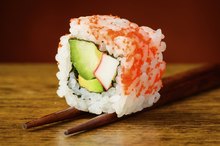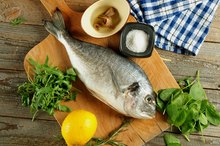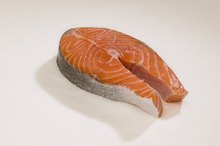What does fact checked mean?
At Healthfully, we strive to deliver objective content that is accurate and up-to-date. Our team periodically reviews articles in order to ensure content quality. The sources cited below consist of evidence from peer-reviewed journals, prominent medical organizations, academic associations, and government data.
- Harvard Health Publications: CHAPTER 1: Understanding Cholesterol: The Good, the Bad, and the Necessary
- American Heart Association: Fish and Omega-3 Fatty Acids
The information contained on this site is for informational purposes only, and should not be used as a substitute for the advice of a professional health care provider. Please check with the appropriate physician regarding health questions and concerns. Although we strive to deliver accurate and up-to-date information, no guarantee to that effect is made.
Sushi Cholesterol Information
In its most basic form, sushi -- composed of fish, rice and seaweed -- makes a healthy addition to your diet. Although fish contains some cholesterol, it also offers protein and healthy fats, so the cholesterol level is not usually enough to cause concern for the average person. When you add components such as fried or fatty ingredients to sushi, however, you raise the potential cholesterol level.
Cholesterol Concepts
Cholesterol is a necessary substance that your body produces on its own. This fat, or lipid, helps form the outer covering of cells, comprises bile acids that aid food digestion in the intestine, and enables the body's production of vitamin D and hormones like testosterone. In fact, your body makes all the cholesterol it needs. When you take in too much dietary cholesterol and saturated fat, your levels of one type of cholesterol, called low-density lipoprotein, go up, leading to blocked arteries. This can result in heart attack and stroke.
- Cholesterol is a necessary substance that your body produces on its own.
- This fat, or lipid, helps form the outer covering of cells, comprises bile acids that aid food digestion in the intestine, and enables the body's production of vitamin D and hormones like testosterone.
Cholesterol in Sushi
Crab Legs and Cholesterol
Learn More
Fish contains cholesterol, although the amount varies from species to species. Unlike meat and dairy, however, it is not a major source of saturated fat in the diet. Fatty meat, eggs, butter and other full-fat dairy products, and fried foods are the worst offenders. Three ounces of bluefin tuna have 32 milligrams of cholesterol and 1 gram of saturated fat, while the equivalent amount of eggs has 316 milligrams of cholesterol and 2.7 grams of saturated fat. As plant foods, rice and seaweed contain no cholesterol and only a trace of saturated fat.
- Fish contains cholesterol, although the amount varies from species to species.
- Unlike meat and dairy, however, it is not a major source of saturated fat in the diet.
Cholesterol and Fish
Unlike meat, dairy and eggs, fish can actually help lower your cholesterol. Fish contains omega-3 fatty acids, which help to raise your good cholesterol, called high-density lipoprotein 2. This type of cholesterol helps carry some of the bad cholesterol out of your body to lower your blood levels. The American Heart Association recommends eating fatty fish -- the best source of omega-3 -- at least twice a week 2. Two fish commonly used to make sushi, tuna and salmon, are rich sources of omega-3s.
Keeping It Healthy
Lobster Nutrition Information
Learn More
Sushi can easily become a poor choice for a low-cholesterol diet when it is made with cholesterol-raising ingredients such as mayonnaise and fried items. As an example, a basic tuna roll has no saturated fat and 25 milligrams of cholesterol, while a crunchy shrimp tempura roll has 6 grams of saturated fat and 65 milligrams of cholesterol. When ordering sushi, stick to basic rolls made with fish and vegetables and skip anything with spicy mayo, tempura and cream cheese.
Related Articles
References
- Harvard Health Publications: CHAPTER 1: Understanding Cholesterol: The Good, the Bad, and the Necessary
- American Heart Association: Fish and Omega-3 Fatty Acids
- USDA National Nutrient Database: Food Search
- University of Maryland Medical Center: Omega-3 Fatty Acids
- American Academy of Family Physicians. High cholesterol. Updated December 5, 2019.
- MedlinePlus. High blood cholesterol levels. Updated February 22, 2018.
- Harvard Health Publishing. How it's made: cholesterol production in the body. Updated July 31, 2019.
- MedlinePlus. Cholesterol levels: what you need to know. Updated April 18, 2019.
- Lepor NE, Vogel RE. Summary of the third report of the National Cholesterol Education Program Adult Treatment Panel III. Rev Cardiovasc Med. 2001;2(3):160-5. doi:10.1001/jama.285.19.2486
- Familial Hypercholestrolemia Foundation. Surprising familial hypercholestrolemia statistics. Updated March 6, 2015.
- Cleveland Clinic. LDL cholesterol and heart health. Updated May 24, 2019.
- Harvard Health Publishing. 11 foods that lower cholesterol. Updated February 6, 2019.
- American Heart Association. Cholesterol medications. Updated November 10, 2018.
- American Heart Association. Prevention and treatment of high cholesterol (hyperlipidemia). Updated April 13, 2017.
- Centers for Disease Control and Prevention. Heart disease. National Center for Health Statistics. Updated February 21, 2020.
- National Heart, Lung, and Blood Institute. High blood cholesterol: What you need to know." Updated June 2005.
- Fallon Jr., L. Fleming. "Hypercholesterolemia." Health AtoZ, Gale Encyclopedia of Medicine. 2006. The Gale Group.
Writer Bio
Jody Braverman is a professional writer and editor based in Atlanta, GA. She received a Bachelor of Arts in English from the University of Maryland, and she is a certified personal trainer, fitness nutrition specialist, and yoga teacher. She has written for various online and print publications, including Livestrong.com, SFGate, Healthfully, and Chron.com. Visit the writer at www.JodyBraverman.com.









